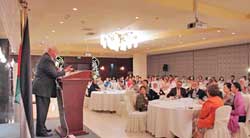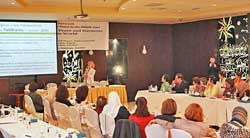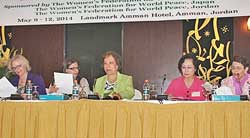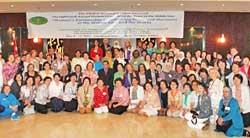2014 Jordan
Women's Partnership in Achieving Peace and Harmony in the Middle East and World
CAROLYN HANDSCHIN
MAY 9-12, 2014 - AMMAN, JORDAN
18th Annual Women's Conference for Peace in the Middle East
The Eighteenth WFWPI Women's Conference for Peace in the Middle East was held in Amman Jordan from May 9-12, 2014. This small country of nearly 8 million inhabitants, which has given a home to 1 million refugees, also welcomed us generously.
May 2014 marked the 10-year anniversary of the WFWPI Middle East Peace Initiative in 2004 that brought 600 women to Palestine and Israel to support women's peace and reconciliation efforts. This year, 120 women leaders from 26 nations, including Europe, the Americas, Asia and the South Pacific and representatives from 17 MENA countries attended. The theme, "Women's Partnership in achieving peace and harmony in the Middle East and the world" provided an opportunity to examine and create awareness about the way that women are significant partners in governance, peacemaking, conflict resolution- and sustainable community building.
What are the strategies that will allow both women and men to bring their capacities and qualities to the table and collectively solve the pressing problems preventing the region -and all of humankind- from enjoying lasting peace? The set of sub-themes focused on were: Mothers raising children in dignity and peace; Women empowering women in the community, and; Women's role in securing a peaceful and prosperous nation.
At the welcoming banquet, participants heard former Jordanian Foreign Minister, H.E. Kamel Abu Jaber speak about the seriousness of his mother in educating her children for character and for excellence. Sheik Dr. Hamdi Murad, respected Islamic scholar, added that "peace without women and girls, can never be peace".
The next morning at the Opening Plenary, Dr. Zoe Bennet, WFWPI IVP for the Middle East, welcomed an overflowing room with a few thoughts about women's boldness in expressing their desire for peace and their perseverance. All conflicts share a similar pain-, which is important for us to remember as we listen to each other. Dr. Lan Young Moon, President of WFWPI addressed her remarks about global villages becomes one community. When one village is suffering, mothers need to take the lead with compassion, sacrifice and service. As one global family, peace in the ME concerns "me". We will go on to Jerusalem with the same message in 5 days. We all yearn for our "original" hometown because in some ways, we are all like orphans.
Mrs. Reem Najar, President of YWCA Jordan and UNICEF Representative in Jordan described the situation of women in the region. They have access to education, stand as members of parliament and hold other positions, but sustainable peace cannot be achieved alone. We need partners. The uprising in Arab world began with a desire to instil democracy, but has become complicated with other groups coming in to seek their form of power. We need to have a plan how we can join forces to continue our cooperation throughout the year.
Ms. Zena Ali Ahmad, United Nations Development Program (UNDP), Country Co-ordinator for Jordan's speech explained how studies have shown that conflicts are born by women although they are not usually the ones who start them, nor asked to resolve them formally. UNDP issued a framework on women in times of conflict that identifies means to support women's participation in peace making and ensure women's protection from all forms of violence during times of conflict and emergency. Tantamount is the call to develop civil society action plans on women, peace and security in the region and to facilitate interaction between government and civil society.
The speech of Ms. Jane Connors, Chief of Special Procedures Branch, Office of the High Commissioner for Human Rights (OHCHR) Geneva, was read to the audience. "The exercise of freedoms of expression, peaceful assembly and association, and participation in public life is fundamental to fostering dialogue, tolerance, upholding the rule of law and realizing good governance. Inclusive and participatory societies are the foundations for democracy. This is underpinned by the participation of women in decision-making processes within the family, local community, as well as in national and global arenas". She spoke about it being a time of critical reflection and OHCHR's strategy for "Widening the Democratic Space" 2014-2017 to address the challenges relating to the exercise of these freedoms, especially by women.
WFWPI UN Office Director, Ms.Carolyn Handschin, chaired Session One, "Mother's raising children in dignity and peace". She reminded the participants that in order to generate solidarity among women and to sharpen our skills in dialogue and advocacy, women need to have confidence in their "local knowledge" and expertise as leaders/parents, mediators, nurturers and managers. But they need to understand some of the dynamics of the larger picture (governments and UN) in order to realize the global demand for those talents and experiences. Amb. Mervat Tallawy, President of the National Council for Women Egypt and former Under Secretary General for the United Nations took on exactly that broader view of the session theme. She thanked WFWPI for persevering over 18 years for the sake of peace in the Middle East. With a call to advocacy to women participants, she explained that it took the UN 60 years to discover SCRes 1325 and 14 hers later, only 36 countries have national action plans.. "As if we do not have brains, to share negotiation, mediation, governance." Her recommendations included: 1) Policies and projects should benefit from gains made by women during wartime; 2) More inclusion and gender balanced social, political power relations in post conflict societies and 3) Effective conflict prevention and management strategies that are inclusive of women.
The next speaker, a member of the Jordanian Ministry provided an opportunity for the audience to ask specific questions related to the situation of women and girls in Jordan. Having worked as a lawyer and rising to influence in an Arab country, she explained how it was possible to be a good mother as well as pursue her professional life, albeit with difficulty at times. The care that women learn as mothers needs to be transferred to the larger society. She stressed the commitment of Jordan to gender equality, referring to the Queen herself. Questions were asked about the concept of "honour crimes" and why the term refers only to girls. The idea was raised for the change of the term from "honour crimes" to "shame or dis-honour" crimes, because the term now used almost excuses the perpetrators. She expressed her conviction that these are ways that policy and norms can change through the active participation of civil society. These crimes are not condoned by Islam. Dr Izzaldin Abuelaesh, renowned medical doctor from Palestine who lost his two beloved teenage daughters to rockets fired into his home and created an organization, "I will not hate" that provides scholarships for young women, spoke from the floor saying, "There is nothing honourable in those acts!"





